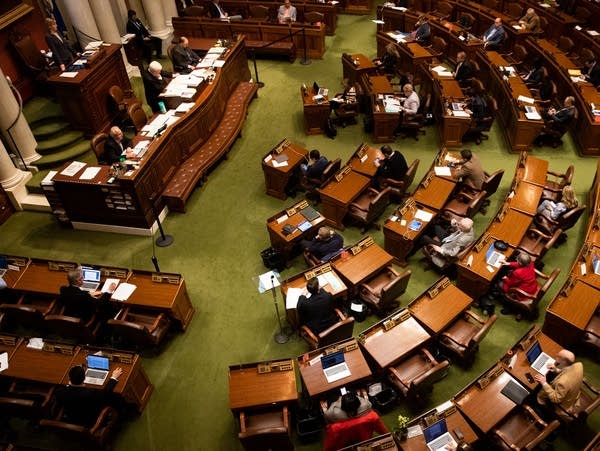Minnesota lawmakers send $330M COVID-19 bill to Walz

Go Deeper.
Create an account or log in to save stories.
Like this?
Thanks for liking this story! We have added it to a list of your favorite stories.
The Minnesota Legislature worked to speed through a $330 million rescue plan Thursday that aims to head off some economic, health and spillover consequences of the coronavirus pandemic.
The proposal, which came together in private, is the second COVID-19 related bill to get swift action from lawmakers in the past two weeks. Together, the two packages shell out more than $500 million, with top legislators saying there will be more actions to come.
The House passed it on a 99-4 vote. The Senate vote was unanimous. Gov. Tim Walz will sign it soon.
House Majority Leader Ryan Winkler, DFL-Golden Valley, said a Legislature with divided-party control united to put together a package that responds to known or anticipated needs. He offered an apology to those who worried about the lack of public input.
Turn Up Your Support
MPR News helps you turn down the noise and build shared understanding. Turn up your support for this public resource and keep trusted journalism accessible to all.
“We have done this work together in adverse conditions,” he said.
But Winkler warned: “We have grave and difficult days ahead.”
House Minority Leader Kurt Daudt, R-Zimmerman, echoed Winkler’s sentiment about pushing toward a common goal even with great uncertainty ahead.
“Unlike the partisan bickering in Washington, we here in Minnesota are working together because that’s what we do,” he said, adding, “We will overcome the COVID-19 crisis.”
Of the latest plan, $200 million will be put into a fund that Walz’s administration will control and parcel out. The Legislature built in some oversight on bigger expenses. Some of the spending that Walz had requested, including emergency checks to people on public assistance programs, didn’t make the cut.
But there are sizable chunks of aid to child care centers, tribal governments, distressed businesses and food shelves and homeless shelters. Minnesotans will get more latitude when applying for driver’s licenses, including the Real ID.

Some lawmakers warned that Minnesota is heading for a financial crisis as more government programs get tapped and anticipated tax revenue tapers. Minnesota had a projected $1.5 billion budget surplus, but that was based on how the economy was performing before the health crisis set in
The bill didn’t win unanimous backing.
Rep. Steve Drazkowski, R-Mazeppa, was among the four “no” votes. He compared the coronavirus situation to a devastating storm.
“What happens during a disaster is you go through, you wait for the winds to die down to actually see what you have,” he said.
But he said things are being done out of order.
“Right now we’re putting together a bill for what we think the problem might be in the future,” Drazkowski said
And not all those who voted for the bill were happy. Among the proposals left out of the bill was relief for hourly school employees and workers compensation guarantees for first responders who fall ill. A provision to provide up to $500 per family on Minnesota’s welfare program also was removed at the last minute, but Republicans promised to work with DFLers on some kind of aid later for families on the economic margins.
Others complained that the assistance to small business wouldn’t go far enough. There were pledges to tackle that later as well.
The Senate vote was 67-0.
Senate Majority Leader Paul Gazelka, R-East Gull Lake, said lawmakers are trying to do what it takes to keep the coronavirus impact in check.
“And we’re all trying to make sure that we don’t kill all the jobs and livelihood of all the people of Minnesota at the same time, and that’s a delicate balance,” Gazelka said.
Senate Minority Leader Susan Kent, DFL-Woodbury, said all sides are pulling together on the virus fight.
"We are reacting to extreme circumstances and I very much appreciate the healthy discussions that we have all had in trying to keep members in trying to keep members safe so that we can continue to do the people's business,” she said.
The House and Senate took unusual steps to conduct their floor session amid health concerns and the need for social distancing.
Some members stayed home, including a few on self-quarantine after coming in contact with people who contracted coronavirus.
Others watched from separate rooms and came to the floor only to vote, prompted by the clerk.
Lawmakers don’t anticipate returning to the Capitol until April 14. Both chambers gave themselves flexibility to hold remote hearings and votes if necessary.
MPR News reporter Tim Pugmire contributed to this report.



